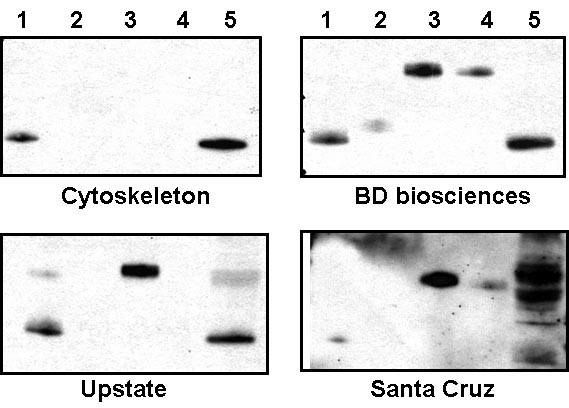Antibodies
Cytoskeleton provides a range of antibodies raised to the Rho family of small G-proteins. They have exceptional isoform specificity and each are provided with human platelet extract as a positive control. For more information on each antibody please click on the products below.
In addition, Cytoskeleton has developed a unique line of fluorescent phalloidins with improved brightness and stability compared to other conjugates such as Alexa Fluor and Cy dyes, for more information see the Acti-stain information page.
Anti-Rac1 Western blot Comparison

Question 1: How do you measure the isoform specificity of your antibodies?
Answer 1: Isoform specificity of our small G-protein antibodies is measured through a rigorous western blot screening process using purified small G-proteins from the entire Rho family to insure that each antibody is specific for its intended protein target. The RhoA specific antibody (Cat. # ARH05) has been tested against not only RhoB and RhoC, but also Ras-H, Rac1 and Cdc42 proteins. ARH05 will not cross react with ten-fold excess of RhoB, RhoC, Ras-H, Rac1 or Cdc42 proteins. Most commercially available Rac1 antibodies also recognize Rac2, Rac3 and/or Cdc42 proteins. Our Rac1 specific antibody (Cat. # ARC03) has been tested against Rho, Rac2, Rac3 and Cdc42 proteins and only detects Rac1 protein. Similarly, the Cdc42 specific antibody (Cat. # ACD03) has been tested against Rac and Rho proteins. ACD03 will not cross react with a ten-fold excess of RhoA, RhoB, RhoC, Rac1, Rac2 or Rac3 proteins. For ACD03, non-specific bands have been observed at higher molecular weight in about 50% of cell lines tested.
Question 2: What antibody affinity is good for western blots and ELISAs?
Answer 2: Optimal antibody affinities differ based on the experimental format being utilized. For western blotting, an antibody dilution range of 1:100 to 1:10,000 from a 1 mg/ml stock is typical. Another way to express these values is a Molarity concentration along a log scale. For western blotting, the useful antibody affinity (Kd) is 10-4 to 10-12 M. For ELISAs, the useful Kd range is 10-8 to 10-12 M.
